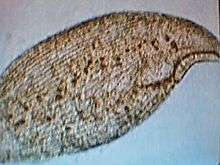Loxodidae
| Loxodidae | |
|---|---|
 | |
| Loxodes | |
| Scientific classification | |
| Domain: | Eukaryota |
| (unranked): | SAR |
| (unranked): | Alveolata |
| Phylum: | Ciliophora |
| Subphylum: | Postciliodesmatophora |
| Class: | Karyorelictea |
| Order: | Loxodida |
| Family: | Loxodidae Bütschli, 1889 |
| Genera | |
Loxodidae is a family of karyorelict ciliates.[1]
Loxodidae members possess an elongated, laterally flattened shape. They share two key characters: a beak-like anterior rostrum interrupting the perioral kineties, and peculiar cytoplasmic organelles named Müller vesicles.[2]
The extensive development of lacunae of the smooth endoplasmic reticulum leads to strong vacuolization of the endoplasm. This feature is associated to a lack of contractile vacuoles in all loxodids.[3]
The term Loxodidae derives from the ancient greek λοξός (loksós), meaning "oblique, tilted".[4][5]
Gravitaxis
Loxodidae members possess the ability to orient themselves in oxygen gradients. They use gravity as a stimulus for this spatial orientation, a phenomenon called gravitaxis or geotaxis. Loxodid ciliates must therefore have developed mechanoreceptors telling them what is up or down. A likely candidate structure is the Müller vesicle, a peculiar organelle characterizing Loxodidae. The organelle comprises a mineral body covered by a membrane, the statolith, and a vacuole, and may act as a gravity sensor.[6][7]
Phylogeny
Molecular phylogeny based on sequences of the SSU rRNA gene indicates that Remanella and Loxodes branch together into a monophyletic family Loxodidae.[8]
References
- ↑ "WoRMS - World Register of Marine Species - Loxodidae Bütschli, 1889". www.marinespecies.org. Retrieved 2017-02-15.
- ↑ Kim, Ji-Hye; Kwon, Choon-Bong; Yoon, Jae-Sool; Shin, Mann-Kyoon (2009). "First Record of Three Loxodes Ciliates (Ciliophora: Loxodida: Loxodidae) from Korea". Animal Systematics, Evolution and Diversity. 25 (3): 301–308. doi:10.5635/kjsz.2009.25.3.301.
- ↑ Raikov, Igor B. (1994). "Somatic Cortical and Endoplasmic Fine Structure of Remanella granulosa Kahl (Ciliophora, Karyorelictida)". Archiv für Protisten Kunde. 144: 7–16.
- ↑ Bailly, Anatole (1981-01-01). Abrégé du dictionnaire grec français. Paris: Hachette. ISBN 2010035283. OCLC 461974285.
- ↑ Bailly, Anatole. "Greek-french dictionary online". www.tabularium.be. Retrieved 2017-01-24.
- ↑ Fenchel, Tom; Finlay, Bland J. (1986-02-01). "The Structure and Function of Müller Vesicles in Loxodid Ciliates". The Journal of Protozoology. 33 (1): 69–76. ISSN 1550-7408. doi:10.1111/j.1550-7408.1986.tb05560.x.
- ↑ Hemmersbach, Ruth; Voormanns, Regine; Briegleb, Wolfgang; Rieder, Norbert; Häder, Donat-P. (1996-06-27). "Influence of accelerations on the spatial orientation of Loxodes and Paramecium". Journal of Biotechnology. Biology Under Microgravity Conditions in Spacelab IML-2. 47 (2–3): 271–278. doi:10.1016/0168-1656(96)01337-5.
- ↑ Xu, Yuan; Gao, Shan; Hu, Xiaozhong; Al-Rasheid, Khaled A. S.; Song, Weibo (2013-08-01). "Phylogeny and systematic revision of the karyorelictid genus Remanella (Ciliophora, Karyorelictea) with descriptions of two new species". European Journal of Protistology. 49 (3): 438–452. doi:10.1016/j.ejop.2012.12.001.
External links
-
 Data related to Loxodidae at Wikispecies
Data related to Loxodidae at Wikispecies